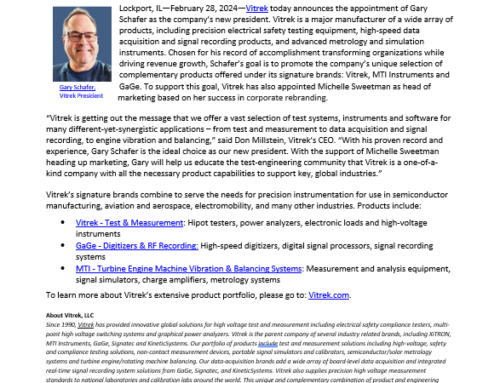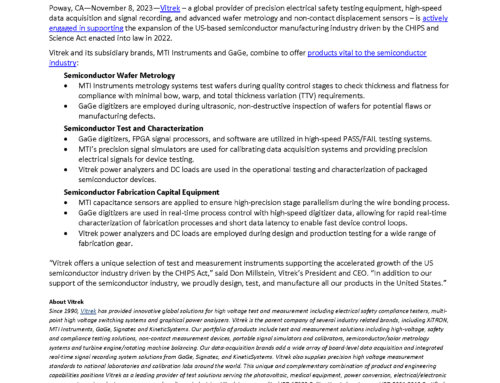
NEW YORK, December 16, 2021 – MTI Instruments division, a manufacturer of precision tools and testing equipment for electronics, aviation, automotive, power and other industries, today announced that it has entered into the advanced qualification stage for its electric vehicle (EV) battery measurement device with several major automotive OEM manufacturers.
Moshe Binyamin, President and CEO of MTI Instruments commented, “We committed to shareholders that we would communicate with them as we began to get traction in the growing and large EV Battery manufacturing segment. I am pleased to report, we are gaining serious traction.”
Binyamin further added, “In fact, one-system integrator working with a major European automotive manufacturer, recently ordered an additional system to accelerate the final testing and adoption of MTI’s thickness monitoring solution into their manufacturing process.”
Background and System Details
Five systems integrators approach MTI: Beginning in late 2020, MTI was approached by as many as five separate system integrators working on EV battery manufacturing to aid with monitoring the thickness of EV battery elements including the dielectric separator. All constituent elements of the EV battery “basic element” involves exacting precision in material thickness and design compliance for both performance and safety resulting in lower unit costs. MTI has established the core measurement approaches required to measure the key element in a high-volume domain.
The measurement requirement is to deliver a material thickness measurement system that can repeatedly measure in-situ material thickness with micron-level accuracy. MTI has been conducting the qualification trials since early 2021 and despite pandemic challenges, MTI’s OEM partners are reporting positive progress.
Link to more information on MTI’s Accumeasure EV System: https://vitrek.com/applications/measure-ev-battery-plate-thickness/
Why the measurement system is important: The EV battery market is experiencing exponential interest and demand and a precise measurement system is essential to optimize battery range, capacity and lower unit costs. If material in the battery is too thin there is a risk of overheating and a possible breach but if the separator is too thick the battery will have diminished capacity. A very precise thickness range needs to be measured and monitored to minimize reject rates. Material compliance needs to be extremely precise with real-time thickness feedback as it is being manufactured to be dynamically adjusted.
Evidence that MTI solves an industry-wide issue: Binyamin further stated, “We currently have five OEMs in the qualification phase and have worked intimately with each OEM and adjusted our technology to fit their exact needs. Additionally, we are receiving strong interest and qualification testing in multiple parts of the world from top EV car companies in the US, Europe and Asia that are developing high-capacity batteries. With just about every major car manufacturer that is in the electric vehicle adoption phase, there is a clear growing demand with an extremely large market opportunity.”
Ken Ameika, Global Sales Director of MTI Instruments added, “The encouraging signs around this market are due to both the number of initiatives we have seen around this particular need as well as the follow-up order from a major European automotive manufacturer. We remain optimistic about both our prospects to deliver a unique solution and the rapidly developing market of EV battery manufacturing.”
About MTI Instruments
Based in Albany, New York, MTI Instruments, Inc., a wholly-owned subsidiary of Soluna Holdings Inc., is a global leader in non-contact measurement tools and condition-based monitoring systems with a growing customer base spanning more than 60 countries. MTI Instruments has a rich history in innovation for developing and manufacturing sensors and systems to help clients secure the highest level of accurate measurements in order to drive innovation, identify efficiencies and increase competitiveness. MTI Instruments provides comprehensive solutions to better address challenges and applications within numerous industries, including industrial manufacturing, consumer electronics, semiconductor, solar, commercial and military aviation, automotive, transportation and R&D.


